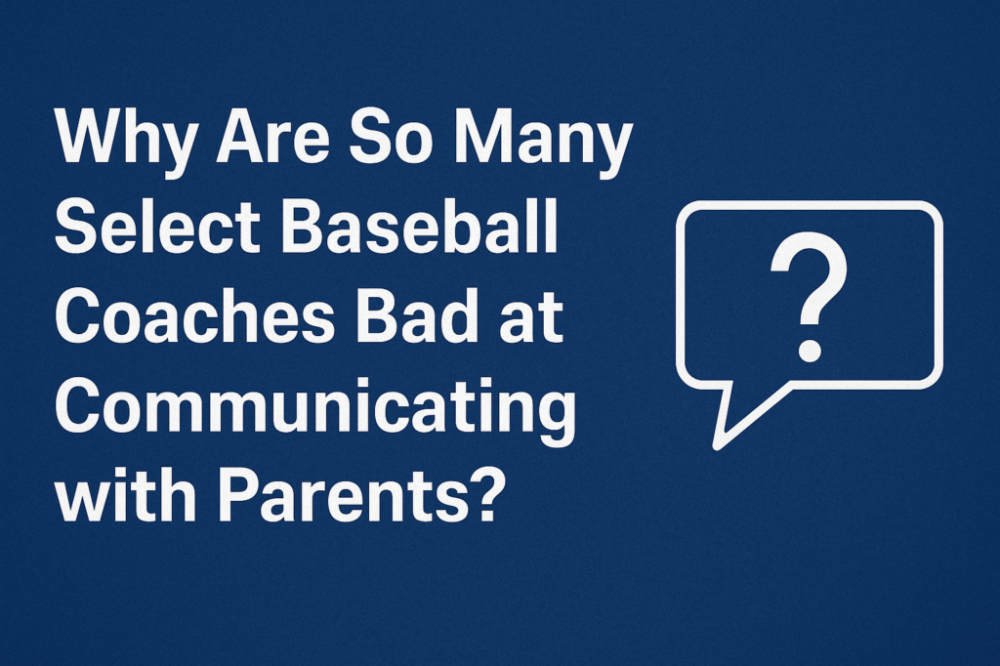Does your Select Baseball Coach Suck at Communicating? You’re not alone.
You signed up for select baseball expecting high-level coaching, great development, and a team-first culture. What you didn’t expect was being left in the dark—about schedules, playing time, tournament plans, or even what’s going on with your own child.
You’re not alone. Across North Texas and beyond, parents are asking the same thing:
Why is communication with select coaches so bad?
Let’s break down why this happens—and what a good select baseball program should be doing instead.
⚾ 1. They’re Coaches, Not Communicators
Most select coaches come from playing or training backgrounds. They know how to teach a swing, build a lineup, and run a practice—but they haven’t been trained in communication, conflict resolution, or leadership outside of the dugout.
The result? Poor emails, missed updates, vague answers, and long stretches of silence that leave parents guessing.
⚾ 2. They’re Overextended
Many coaches are juggling multiple teams, private lessons, facility rentals, tournament travel, and administrative duties. That’s no excuse—but it explains why consistent communication often falls to the bottom of the list.
When the calendar’s packed, things like parent updates, schedule changes, or follow-ups on concerns are the first to go.
⚾ 3. They’re Trying to Avoid Drama
Let’s be honest—some coaches have had bad experiences with difficult parents. In response, they build a wall: “We don’t talk about playing time,” or “That’s a coaching decision.” While that boundary is understandable, it can go too far and leave every parent feeling shut out.
⚾ 4. They Don’t Want to Be Second-Guessed
Some coaches avoid explaining decisions (especially around playing time or position changes) because they fear opening a can of worms. Instead of risking a debate, they go quiet.
But the lack of explanation creates confusion—and that confusion often turns into frustration.
⚾ 5. There’s No Communication System
Too many teams lack a clear, consistent communication plan. Maybe there’s no regular newsletter, no structured app like GameChanger or TeamSnap, or no designated team liaison. Without a system, communication becomes reactive and inconsistent.
⚾ 6. They Don’t Understand the Parent Perspective
Parents in select baseball are all-in—financially, emotionally, and with their time. Coaches who don’t fully grasp that level of investment might not see how critical good communication is to building trust and loyalty.
Ignoring questions or staying silent doesn’t just cause confusion—it feels disrespectful to the people funding the experience.
✅ What Great Select Coaches Do Differently
The best programs treat parents as partners—not problems. They recognize that strong communication creates a better experience for everyone.
Here’s what that looks like:
-
Regular team updates and recaps
-
Clear expectations around roles and decisions
-
Honest, respectful conversations when needed
-
Using tools (emails, apps, meetings) to stay proactive
It’s not about over-sharing or explaining every pitch—it’s about clarity, consistency, and respect.
💭 Final Thought
If you’re feeling frustrated with a lack of communication, know this: it’s not just you, and it’s not unreasonable to expect more. Parents make a huge investment in select baseball, and communication should be part of what you’re paying for.
A program that prioritizes communication isn’t just more professional—it’s more enjoyable for the entire family.
TL;DR:
Many select coaches struggle with communication because they’re overextended, conflict-averse, or unaware of the parent perspective. But consistent, respectful communication is key to building trust, improving morale, and creating a better experience for players and families alike.









